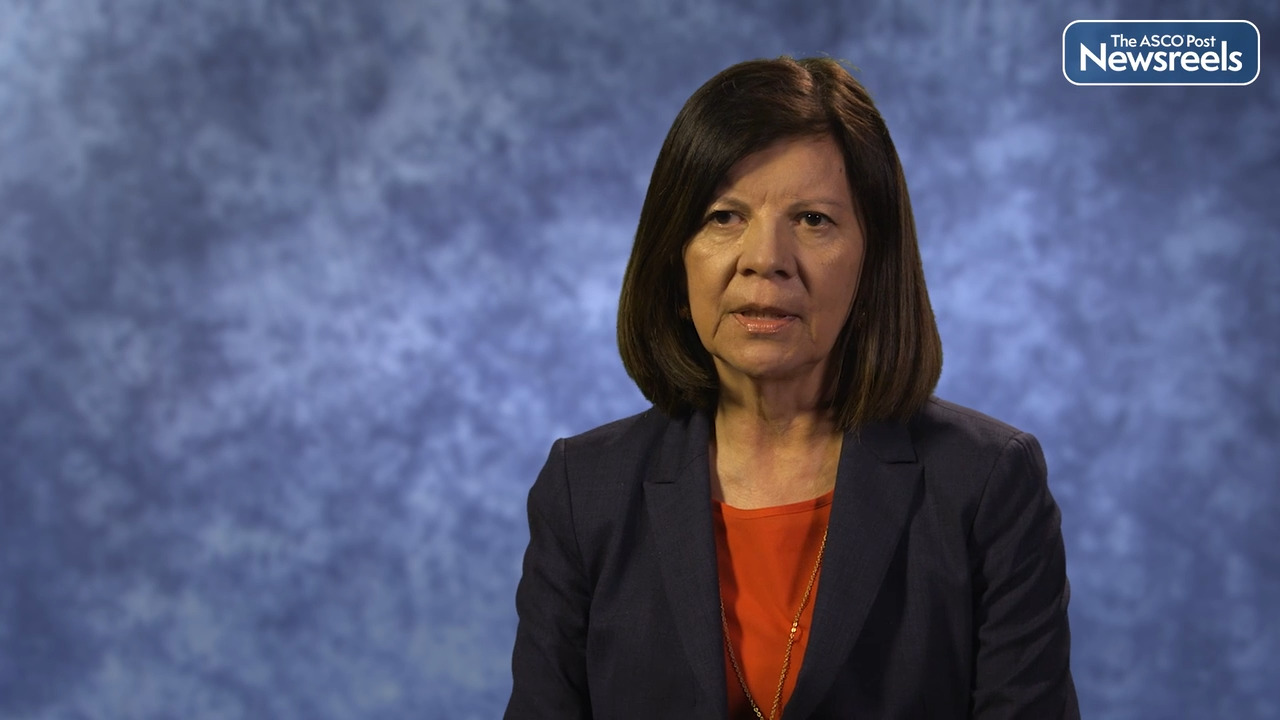Maria Elena Martinez, PhD, MPH, on Colorectal Cancer Screening in Underserved Populations: COVID, Silver Linings, and Challenges Ahead
Maria Elena Martinez, PhD, MPH, of the University of California, San Diego Moores Cancer Center, provides an overview of the key components of the Accelerating Colorectal Cancer Screening and Follow-up through Implementation Science program, challenges posed by the COVID-19 pandemic, and opportunities for overcoming these challenges. Although screening and follow-up may reduce the incidence of and mortality from colorectal cancer, these disparities persist in medically underserved populations (Abstract SY30).
Reid M. Ness, MD, MPH, on Colorectal Cancer: Updates in Screening Recommendations
Reid M. Ness, MD, MPH, of Vanderbilt-Ingram Cancer Center, discusses significant updates to the NCCN Clinical Practice Guidelines in Oncology for colorectal cancer screening: lowering the age from 50 to 45 for the initiation of average-risk screening for all combinations of race, ethnicity, and sex; and extending the surveillance interval from 5 to 7–10 years following the identification of one to two low-risk adenomas.
Tumor Budding May Provide Independent Prognostic Value for Disease-Free and Overall Survival in Patients With Stage III Colon Cancer
Tumor budding is an emerging prognostic biomarker in colon cancer and currently influences decision-making in patients with pT1 and stage II colon cancer. In stage III colon cancer, its prognostic impact has been limited to small and retrospective cohorts. In a post hoc analysis of the IDEA-France...
Risk of Colorectal Cancer May Be Linked to Cumulative Time With Excess Body Weight
In a German study reported in JAMA Oncology, Li et al found that assessment of risk of colorectal cancer based on cumulative lifetime excess weight may be more accurate than risk indicated by single body mass index (BMI) measurements. As stated by the investigators, “Excess weight is associated...
Short-Term Radiotherapy Plus Preoperative Chemotherapy vs Long-Term Chemoradiotherapy for Locally Advanced Rectal Cancer
In the Chinese phase III STELLAR trial reported in the Journal of Clinical Oncology, Jin et al found that preoperative short-term radiotherapy followed by chemotherapy was not inferior in 3-year disease-free survival vs a standard schedule of long-term chemoradiotherapy in patients with locally...
Adjuvant Therapy for Colon Cancer: Impact of Stopping Treatment Early
For patients with stage III colon cancer, early discontinuation of adjuvant chemotherapy leads to worse outcomes—but early discontinuation of oxaliplatin did not. These findings, which came from an analysis of the large ACCENT and IDEA clinical trials databases, were presented at the 2022 ASCO...
High Response Rate Seen With Nivolumab Added to Encorafenib and Cetuximab in BRAF V600E–Mutated Metastatic Colorectal Cancer
The combination of encorafenib, cetuximab, and nivolumab produced responses in 50% of patients and disease control in 96% of patients with microsatellite-stable BRAF V600E–mutated metastatic colorectal cancer in a phase I/II trial reported at the 2022 ASCO Gastrointestinal Cancers Symposium. The...
Recent FDA Approvals in Gastrointestinal Cancer
Over the past year, the U.S. Food and Drug Administration granted approval to several novel drugs and new indications for older therapeutic agents used in gastrointestinal oncology. Cetuximab Plus Encorafenib On September 28, 2021, cetuximab (Erbitux) was approved in combination with encorafenib...
NIPICOL Trial: Promising Outcomes With Shorter Duration of Checkpoint Inhibition in Metastatic Colorectal Cancer
The phase II GERCOR NIPICOL study evaluated 1 year of treatment with nivolumab plus ipilimumab in patients with chemotherapy-resistant metastatic colorectal cancer whose tumors were microsatellite instability–high (MSI-H) or mismatch repair–deficient (dMMR). With this shortened treatment duration,...
Sotorasib in Previously Treated Patients With KRAS G12C–Mutant Colorectal Cancer
In a prespecified analysis of the phase II CodeBreaK100 trial reported in The Lancet Oncology, Marwan Fakih, MD, and colleagues found that the KRAS G12C protein inhibitor sotorasib showed modest activity in patients with previously treated KRAS G12C–mutant colorectal cancer.1 Study Details The...
BRAF-Mutant Colorectal Cancer: Latest Findings for Targeted Treatment
The phase II ANCHOR CRC study, the largest prospective study of BRAF inhibitor–based therapy as first-line treatment of metastatic colorectal cancer, has met its primary endpoint, with 47.8% of patients with metastatic colorectal cancer responding to first-line treatment with encorafenib,...
Addition of Neoadjuvant FOLFIRINOX to Preoperative Chemoradiotherapy in Locally Advanced Rectal Cancer
As reported in The Lancet Oncology by Thierry Conroy, MD, and colleagues, the French phase III UNICANCER-PRODIGE 23 trial has shown that intensification of preoperative therapy with FOLFIRINOX (oxaliplatin, irinotecan, leucovorin, fluorouracil [5-FU]) prior to chemoradiotherapy resulted in...
Temozolomide Followed by Low-Dose Ipilimumab/Nivolumab in MSS and MGMT-Silenced Metastatic Colorectal Cancer
In an Italian phase II study (MAYA) reported in the Journal of Clinical Oncology, Morano et al found that patients with microsatellite-stable (MSS) and O6-methylguanine–DNA methyltransferase (MGMT)-silenced metastatic colorectal cancer without disease progression on temozolomide derived benefit...
Gabriel A. Brooks, MPH, MD, Comments on the ACCENT/IDEA Database Analysis Results
Gabriel A. Brooks, MPH, MD, Associate Professor of Medicine, Norris Cotton Cancer Center at Dartmouth-Hitchcock Medical Center, was invited to discuss the results of the ACCENT/IDEA database analysis of early treatment discontinuation in stage III colon cancer.1 Although the results confirm the...
Adjuvant Therapy for Colon Cancer: Impact of Stopping Treatment Early
For patients with stage III colon cancer, early discontinuation of adjuvant chemotherapy leads to worse outcomes—but early discontinuation of oxaliplatin did not. These findings, which came from an analysis of the large ACCENT and IDEA clinical trials databases, were presented at the 2022 ASCO...
Grieving the Loss of Sexual Intimacy as a Result of Cancer and Its Treatment
About 5 years ago, I began experiencing some digestive issues that I initially blamed on the stress from coping with my mother’s diagnosis of Alzheimer’s disease. But after 2 weeks of unrelenting symptoms, including abdominal pain, a change in my bowel habits, and rectal bleeding, I saw my primary...
Expert Point of View: Christopher Willett, MD
Christopher Willett, MD, Professor and Chair of the Department of Radiation Oncology at Duke University in Durham, North Carolina, shared his thoughts on the findings of the study by Lumish et al1 with The ASCO Post. He first noted the shift in recent years toward total neoadjuvant therapy in the...
Small Study Reports Neoadjuvant PD-1 Blockade Yields 100% Clinical Complete Response Rate in Locally Advanced Mismatch Repair–Deficient Rectal Cancer
In a small study of patients with locally advanced mismatch repair–deficient (dMMR) rectal cancer, treatment with the anti–PD-1 agent dostarlimab-gxly alone led to a clinical complete response rate of 100%. The findings of this study from Memorial Sloan Kettering Cancer Center (MSK) were reported...
Expert Point of View: Benoit Rousseau, MD, PhD
Benoit Rousseau, MD, PhD, of Memorial Sloan Kettering Cancer Center, New York, called the findings of the phase II GERCOR NIPICOL trial “interesting and convincing.” Long-term follow-up showed the 3-year progression-free survival rate to be 70% after just 1 total year of treatment with nivolumab...
NIPICOL Trial: Promising Outcomes With Shorter Duration of Checkpoint Inhibition in Metastatic Colorectal Cancer
The phase II GERCOR NIPICOL study evaluated 1 year of treatment with nivolumab plus ipilimumab in patients with chemotherapy-resistant metastatic colorectal cancer whose tumors were microsatellite instability–high (MSI-H) or mismatch repair–deficient (dMMR). With this shortened treatment duration,...
Updated Findings on T-DXd in Gastrointestinal Malignancies
Updates of phase II studies evaluating fam-trastuzumab deruxtecan-nxki (T-DXd) in gastrointestinal cancers were presented at the 2022 ASCO Gastrointestinal Cancers Symposium, continuing to offer support for the antibody-drug conjugate in these malignancies. In HER2-expressing gastric cancer, T-DXd...
Study Evaluates Whether ctDNA Has Demonstrable Advantage Over Standard Surveillance Methods for Colorectal Cancer
Researchers at City of Hope published data pointing to the limitations of a popular liquid biopsy that is used to detect the recurrence of colorectal cancer in patients who who have undergone surgical resection. The findings were published in JAMA Network Open by Marwan Fakih, MD, and colleagues....
How Does Intake of Unprocessed Red Meat and Processed Meat Impact Risk of Disease Recurrence and Mortality in Patients With Colon Cancer?
In a prospective cohort study reported in JAMA Network Open, Erin L. Van Blarigan, ScD, and colleagues found that higher intake of unprocessed red meat or processed meat was not associated with poorer recurrence-free or overall survival in patients with stage III colon cancer. As stated by the...
Study Finds Taller Adults May Be at Increased Risk for Colorectal Cancer
A new meta-analysis adds to evidence that taller adults may be more likely than shorter ones to develop colorectal cancer or colon polyps that can later become malignant. While the association between taller height and colorectal cancer has been previously investigated, researchers from Johns...
Effect of Screening Initiative on Disparity in Colorectal Cancer Mortality Between Black and White Patients
In an analysis reported in a letter to the editor in The New England Journal of Medicine, Doubeni et al found that a sustained Kaiser Permanente Northern California (KPNC) colorectal cancer screening initiative resulted in increased screening, increased identification of colorectal cancer, and a...
GALAXY Trial: Circulating Tumor DNA Appears Prognostic in Resected Colorectal Cancer
The use of circulating tumor DNA (ctDNA) assays in early-stage colorectal cancer is highly prognostic for recurrence and may help identify patients who could benefit from adjuvant chemotherapy, according to findings from the GALAXY trial, presented at the 2022 ASCO Gastrointestinal Cancers...
Guideline Update Highlights the Importance of Shared Decision-Making Regarding the Use of Adjuvant Therapy in Stage II Colon Cancer
ASCO has published updated guidance on the use of adjuvant therapy in the management of stage II colon cancer, providing clinicians with a newer evidence-based framework that can be used in shared decision-making with patients.1 Need for Updated Guidance “How to approach patients with stage II...
High Response Rate Seen With Nivolumab Added to Encorafenib and Cetuximab in BRAF V600E–Mutated Metastatic Colorectal Cancer
The combination of the BRAF inhibitor encorafenib with cetuximab and nivolumab produced responses in 50% of patients and disease control in 96% of patients with microsatellite-stable BRAF V600E–mutated metastatic colorectal cancer in a phase I/II trial reported at the 2022 ASCO Gastrointestinal...
SOLSTICE Trial: Trifluridine/Tipiracil Plus Bevacizumab in Metastatic Colorectal Cancer
For the treatment of metastatic colorectal cancer in patients unfit for intensive chemotherapy, trifluridine/tipiracil plus bevacizumab as first-line therapy was no more effective than capecitabine plus bevacizumab, investigators from the phase III SOLSTICE trial reported in a European Society for...
Can Weight Loss in Adulthood Reduce the Risk of Developing Colorectal Adenomas?
Weight loss for adults, particularly those who are overweight or obese, may reduce their risk of developing a type of polyp that may lead to colorectal cancer, according to a new study published by He et al in JNCI Cancer Spectrum. Losing weight from early to late adulthood (up to the mid-70s)—at...
Romain Cohen, MD, PhD, on Metastatic Colorectal Cancer: Long-Term Follow-up on Nivolumab Plus Ipilimumab
Romain Cohen, MD, PhD, of Sorbonne University and Saint-Antoine Hospital, discusses phase II results of the GERCOR NIPICOL study, which suggests nivolumab plus ipilimumab at a fixed duration of 1 year continued to show durable activity in patients with chemoresistant microsatellite instability–high/mismatch repair–deficient metastatic colorectal cancer after 3 years of follow-up. Dr. Cohen points out there is now some question as to whether all patients need 2 years of therapy (Abstract 13).
Melissa Amy Lumish, MD, on Rectal Cancer: PD-1 Blockade for Mismatch Repair–Deficient Disease
Melissa Amy Lumish, MD, of Memorial Sloan Kettering Cancer Center, discusses new findings showing a 100% complete response rate to PD-1 blockade alone among the first 11 patients with locally advanced mismatch repair–deficient rectal cancer treated with this approach. None of the patients required chemoradiation or surgery, thus avoiding their attendant morbidities, and so PD-1 blockade may represent a new treatment paradigm. Follow-up on the durability of response is needed (Abstract 16).
Van K. Morris, MD, on Metastatic Colorectal Cancer: Early Trial Results on Encorafenib, Cetuximab, and Nivolumab
Van K. Morris, MD, of The University of Texas MD Anderson Cancer Center, discusses phase I/II data suggesting that encorafenib plus cetuximab and nivolumab is safe and well tolerated for patients with microsatellite-stable BRAF V600E–mutated metastatic colorectal cancer (Abstract 12).
Genetic and Lifestyle Calculator May Help to Identify Younger Adults at Risk of Colorectal Cancer
A new risk score may aid in identifying men and women younger than 50 who are most likely to develop a cancer of the colon or rectum, an international study published by Archaumbault et al in the Journal of the National Cancer Institute showed. More About Scoring The score—a number between 0 and...
Gabriel A. Brooks, MPH, MD, on Colorectal Cancer: Expert Perspective on the Need to Deintensify Oxaliplatin
Gabriel A. Brooks, MPH, MD, of the Norris Cotton Cancer Center, discusses key studies that, when synthesized, suggest the benefits of oxaliplatin may be less than often assumed. The toxicities are well described (especially neuropathy), and the agent should be used cautiously and sparingly beyond the third month of adjuvant treatment for patients with colon cancer and in the elderly or frail with metastatic disease.
Young Adults May Have the Greatest Risk of Distant-Stage Colorectal Cancer, With the Highest Risk Among Black and Hispanic Patients
Colorectal cancer is the second most common cause of death in the United States. In 2020, approximately 148,000 people were diagnosed with the disease, and 53,200 people died from it, including 17,930 cases and 3,640 deaths in individuals younger than age 50. According to the American Cancer...
Afsaneh Barzi, MD, PhD, on Colorectal Cancer: Early Data on Regorafenib and Pembrolizumab
Afsaneh Barzi, MD, PhD, of City of Hope Comprehensive Cancer Center and AccessHope, discusses results from a phase I/II study of regorafenib and pembrolizumab in refractory microsatellite-stable colorectal cancer. Although the trial did not meet its primary endpoint, the median overall survival is “provocative,” says Dr. Barzi. An analysis of biomarkers to identify patients with a longer duration of benefit is ongoing (Abstract 15).
Heinz-Josef Lenz, MD, on Colorectal Cancer: Update From the CheckMate 9X8 Trial on Nivolumab, mFOLFOX6, and Bevacizumab
Heinz-Josef Lenz, MD, of USC Norris Comprehensive Cancer Center, discusses phase II results from the CheckMate 9X8 study, which compared nivolumab plus fluorouracil/leucovorin/oxaliplatin (mFOLFOX6) and bevacizumab vs mFOLFOX6 and bevacizumab in the first-line treatment of metastatic colorectal cancer. A subgroup of patients may benefit from adding nivolumab to the standard of care in this setting (Abstract 8).
Addition of Diet and Lifestyle Factors to Recurrence and Mortality Prediction Models for Patients With Stage III Colon Cancer
In a study reported in the Journal of Clinical Oncology, Cheng et al found that the addition of patient-reported diet and lifestyle factors to prediction models based on clinical and pathologic characteristics improved predictions of disease recurrence and mortality among patients with stage III...
Mehmet Altan, MD, on Solid Tumors: Interim Safety and Efficacy Results on NKTR-255 Plus Cetuximab
Mehmet Altan, MD, of The University of Texas MD Anderson Cancer Center, discusses findings from a phase Ib dose-escalation study, which showed early evidence of activity for NKTR-255, an investigational IL-15 receptor agonist, plus cetuximab in patients with solid tumors. Treatment appeared to lead to expansion and proliferation of NK and CD8+ cells (Abstract 957).
Study Uses Data From a Nationally Representative Colonoscopy Registry to Gather Information on Early-Onset Colorectal Precancerous Lesions
In a study published in the journal Gastroenterology, Trivedi et al described an increase in early-onset colorectal cancer and precancerous polyps, based on a large, nationally representative study of patients younger than 50 who underwent colonoscopy. It was the first large-scale study to look at...
Single-Cell Transcriptomic and Imaging Atlas of Colorectal Polyps Provides Insights for Cancer Surveillance
A team of researchers has revealed some of the mechanisms by which polyps develop into colorectal cancer, setting the framework for improved surveillance for the disease. Their study, published by Chen et al in the journal Cell, describes findings using a single-cell transcriptomic and imaging...
Does Geography Play a Role in Early-Onset Colorectal Cancer in Young Black Men?
Although the incidence and mortality rates in colorectal cancer have dropped by 3.6% each year from 2007 to 2016 for people aged 55 and older—mainly because of increased colorectal cancer screening, advances in therapy, and reductions in smoking—these rates have increased by 2% each year during the ...
I Don’t Know Why I Got Young-Onset Colorectal Cancer
Throughout my adolescence and early adulthood, I had been plagued with digestive issues, including bouts of gastritis and constipation, which seemed normal for me and wasn’t too concerning. But by the time I turned 30, in 2015, the acid reflux I had been experiencing became so frequent and...
Study Examines Rates of Breast and Colorectal Cancer Screening Among Rural Women
Women who live in urban areas and those residing in rural areas are screened for breast cancer at similar rates, but rural women are screened for colorectal cancer at significantly lower rates than their urban counterparts, research published by Shete et al in JAMA Network Open showed. The...
Solving the Conundrum of Young-Onset Colorectal Cancer
Although research so far has failed to uncover the root causes of the development of young-onset colorectal cancer, what is certain is that although colorectal cancer rates are declining in older adults, they are on a steady rise in people younger than age 50, especially those between the ages of...
Colorectal Cancer Screening: Preferences of Gastroenterologists and Primary Care Clinicians
Despite the availability of several effective screening tests, colorectal cancer screening rates remain below national goals. Although colonoscopy is the most often recommended screening method, a new study has found that the preferences of primary care clinicians have shifted toward noninvasive...
Sotorasib in Previously Treated Patients With KRAS G12C–Mutant Colorectal Cancer
In a prespecified analysis of the phase II CodeBreaK100 trial reported in The Lancet Oncology, Marwan Fakih, MD, and colleagues found that the KRAS G12C protein inhibitor sotorasib showed modest activity in patients with previously treated KRAS G12C–mutant colorectal cancer. Study Details The...
Update on the Role of Low-Dose Aspirin in Colorectal Cancer Prevention
Updating its 2016 recommendation on the use of aspirin to prevent cardiovascular disease and colorectal cancer, the U.S. Preventive Services Task Force (USPSTF) issued a draft recommendation statement. It noted the potential harms of daily aspirin, with the most serious being bleeding in the...
Association of TP53 Gain-of-Function and Non–Gain-of-Function Mutations With Outcomes in Left-Sided vs Right-Sided Metastatic Colorectal Cancer
In a study reported in the Journal of Clinical Oncology, Pan et al found that overall survival was poorer among patients with metastatic right-sided vs left-sided colorectal cancer with TP53 mutations, driven by poorer outcomes in those with non–gain-of-function mutations, and that gain-of-function ...









